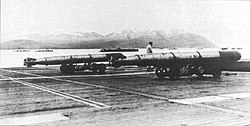Type 91 torpedo
| Type 91 torpedo | |
|---|---|

Type 91 torpedoes aboard an aircraft carrier.
|
|
| Type | Aerial torpedo |
| Place of origin | Japan |
| Service history | |
| In service | 1931–1945 |
| Used by | Imperial Japanese Navy |
| Wars | World War II |
| Production history | |
| Designer | Rear Admiral Seiji Naruse and his team |
| Designed | 1930–1945 |
| Unit cost | 20,000 yen (in the year 1941) |
| Specifications | |
| Weight | 848 kg (1,870 lb) |
| Length | 5.270 m (17.29 ft) |
| Diameter | 45 cm (18 in) |
|
|
|
| Maximum firing range | 2,000 m (2,187 yd) |
| Warhead weight | 323.6 kg with high explosive 235 kg, (713.4 lb with 518 lb) for Type 91 warhead rev.3 |
|
|
|
| Engine | wet-heater type, 8-cylinder radial engine 200hp |
| Wingspan | 69 cm (27¼ in. in the air), 66 cm (26 in. in the water) |
| Speed | 42 knots (77.8 km/h, 48.3 mile/h) |
|
Steering
system |
gyrocompass guided vertical rudder control system, gyroscope guided anti-rolling controller system |
|
Launch
platform |
single-engine carrier-based attack aircraft, twin-engine land-based attack aircraft |
The Type 91 was an aerial torpedo of the Imperial Japanese Navy which was designed to be launched from an aircraft. It was used in naval battles in World War II.
The Type 91 aerial torpedo had two unique characteristics:
This system made it possible to release the Type 91 not only at a cruising speed of 180 knots (or 333 km/h, 207 mile/h) at an altitude of 20 m (66 ft), but also in a power-glide torpedo-bombing run at the Nakajima B5N2 Kate's maximum speed of 204 knots (or 378 km/h, 234 mile/h).
The Type 91 torpedo was 450 mm (17¾ in) diameter. There were five models put into service, with high explosive warheads weighing 213.5 kg to 526.0 kg (or 470.7 lb to 1160 lb) and having effective ranges of 1,500 m to 2,000 m (or 1,640 yd to 2,187 yd) at 42 knots (77.8 km/h or 48.34 mph).
Since the Type 91 torpedo was the only practical aerial torpedo of the Imperial Japanese Navy, it was simply known as the Koku Gyorai, or aerial torpedo. Surface warships and submarines used other types of torpedo, namely the Type 93 and Type 95 respectively, while the Type 97 torpedo was designed for use by midget submarines.
The Thunder fish, type 91 torpedo (modification 2), was a shallow water aerial torpedo that was designed for and used in the attack on Pearl Harbor in 1941. Conventional torpedoes when launched from aircraft would dive to 100 ft before turning up to hit their targets. The waters of the lagoon at Pearl Harbor were much shallower so wooden fins were added to allow for shallow launching at low altitude.
The name Thunder fish is a literal translation of the Japanese gyorai, meaning "torpedo" (gyo = fish, rai = thunder).
The tactic was practised at a bay on Kyūshū island which resembled Pearl Harbor before being used in the attack in December 1941, launched from "Kate" Nakajima B5N torpedo bombers. The plan for attack was designed by naval air strategist Minoru Genda for Admiral Isoroku Yamamoto in the face of opposition from the majority Japanese navy view that victory could be achieved by the "The Great All-Out Battle" tactic of luring United States battleships into a major action at sea.
...
Wikipedia
